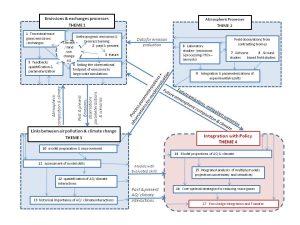Scientific Plan
The project is organized into four Scientific Themes designed to optimize the integration of methodologies, scales, and ultimately our understanding of air quality and climate interactions:
- Team 1 – Anthropogenic and biogenic emissions and their response to climate and socio-economy
- Team 2 – Atmospheric interactions among chemical and physical processes
- Team 3 – Regional and global links between atmospheric chemistry and climate change
- Team 4 – Air quality in a changing climate: Integration with policy
The scientific work, coordination of the project and results dissemination are achieved by 18 work-packages (WPs) that are clearly interconnected as shown in the pert diagram below:

WP Table
| WP Number | PEGASOS WorkPackages | Type of Activity |
| WP1 | Terrestrial trace gas emissions at the chemistry-climate interface | RTD |
| WP2 | Anthropogenic emissions and their evolution | RTD |
| WP3 | Future changes in anthropogenic emissions | RTD |
| WP4 | Linking the anthropogenic, biogenic and observational footprint to large-scale model simulations | RTD |
| WP5 | Quantifying and parameterising feedbacks in the atmosphere-biosphere system | RTD |
| WP6 | Laboratory studies | RTD |
| WP7 | Airborne field studies | RTD |
| WP8 | Ground-based field studies | RTD |
| WP9 | Integration and parameterization of experimental results | RTD |
| WP10 | Model development and improvent | RTD |
| WP11 | Assessment of model skill | RTD |
| WP12 | Quantification of interactions in the AQ-climate system | RTD |
| WP13 | Historical impacts of air quality-climate interactions | RTD |
| WP14 | Model projections of air quality and climate change | RTD |
| WP15 | Integrated analysis of multiple projections | RTD |
| WP16 | Cost-optimal strategies for reducing pollutant concentrations | RTD |
| WP17 | Knowledge integration and transfer | RTD |
| WP18 | Coordination and Management | MGT |


